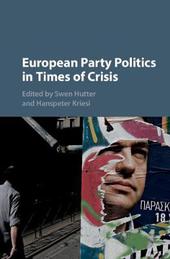
|
European Party Politics in Times of Crisis
Hardback
Main Details
| Title |
European Party Politics in Times of Crisis
|
| Authors and Contributors |
Edited by Swen Hutter
|
|
Edited by Hanspeter Kriesi
|
| Physical Properties |
| Format:Hardback | | Pages:444 | | Dimensions(mm): Height 235,Width 157 |
|
| ISBN/Barcode |
9781108483797
|
| Classifications | Dewey:324.21094 |
|---|
| Audience | | Professional & Vocational | | Postgraduate, Research & Scholarly | | Undergraduate | | General | |
|---|
| Illustrations |
Worked examples or Exercises; 24 Tables, black and white; 57 Line drawings, black and white
|
|
Publishing Details |
| Publisher |
Cambridge University Press
|
| Imprint |
Cambridge University Press
|
| Publication Date |
27 June 2019 |
| Publication Country |
United Kingdom
|
Description
This comprehensive study of party competition in Europe since 2008 aids understanding of the recent, often dramatic, changes taking place in European politics. It addresses how the multiple crises that Europe faces have affected the intensity and structure of party competition, and whether we are seeing a wave of 'critical elections' which will reshape European politics for years to come. The geographical scope of the book covers fifteen European countries, including cases from North-Western Europe (Austria, Britain, France, Germany, Ireland, the Netherlands, and Switzerland), Southern Europe (Greece, Italy, Portugal, and Spain), and Central-Eastern Europe (Hungary, Latvia, Poland, and Romania). Using original data from a large-scale content analysis of mass media, and the debates among parties in election campaigns, this book provides clear graphical presentations of the results, appealing to a wide readership of students, scholars, journalists, practitioners, and the politically interested public.
Author Biography
Swen Hutter is Lichtenberg-Professor in Political Sociology at Freie Universitat Berlin, and Vice Director of the Center for Civil Society Research, a joint initiative of Freie Universitat and the Wissenschaftszentrum Berlin fur Sozialforschung. Hutter is the author of Protesting Culture and Economics in Western Europe (2014) and co-editor of Politicising Europe (Cambridge, 2016). Hanspeter Kriesi holds the Stein Rokkan Chair in Comparative Politics at the European University Institute, Florence. He was the director of a Swiss national research programme on 'Challenges to democracy in the 21st century' from 2005-12. Currently, he is the principal investigator of the ERC project 'Political Conflict in Europe in the Shadow of the Great Recession'.
Reviews'This is a comprehensive analysis of how the Great Recession has shaped the politics of Europe. Employing original data for fifteen countries, the authors provide an invaluable guide to the structure of democratic competition and the rise of a cultural cleavage over the past decade. The result is an compelling analysis that is required reading for students of Europe and democratic politics more generally.' Gary Marks, Burton Craige Professor of Political Science and Robert Schuman Fellow, European University Institute 'Drawing on new and extensive datasets, Hutter and Kriesi's volume highlights how the Great Recession impacted on the structure of political conflict, often serving as a catalyst of party system change, but that the impact varied (sometimes significantly) across the continent. European Party Politics in Times of Crises is a landmark publication that deserves to be on the bookshelves of all scholars of party politics.' Tim Haughton, University of Birmingham 'This impressive volume investigates the impact of the financial crisis on the electoral and protest arenas of European countries. It stands out from similar attempts by combining meticulous analysis of media data with exceptional sensitivity to the timing of the economic crisis in relation to political developments, the strategies of political actors and the specific issues that dominated and polarised the public debates. The book documents the continuity and transformation of the political space in Europe and the increasingly divergent regional patterns. It is a must-read for anyone interested in how European parties and ordinary citizens reacted to the crisis, and how the competition between cultural, economic and political understandings of the challenges led to a new socio-political configuration on the continent.' Zsolt Enyedi, Central European University
|